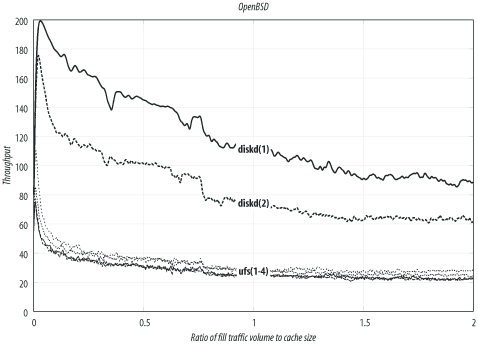D.5 OpenBSD
The results in this section are from OpenBSD Version 3.3 (released May 1, 2003). I built a kernel with the following notable configuration options:
option MSGMNB=8192 option MSGMNI=40 option MSGSEG=512 option MSGSSZ=64 option MSGTQL=2048 option SHMSEG=16 option SHMMNI=32 option SHMMAX=2048 option SHMALL=4096 option NMBCLUSTERS=32768 option MAXFILES=8192
Table D-3 and Figure D-3 summarize the OpenBSD results. The choices for OpenBSD are similar to those for FreeBSD. Unfortunately, however, coss doesn't run on OpenBSD, which lacks the aio_read( ) and aio_write( ) functions.
|
Storage scheme |
Filesystem |
Mount options |
Throughput |
Response time |
Hit ratio |
|---|---|---|---|---|---|
|
diskd(1) |
UFS |
async, noatime, softupdate |
91.1 |
1.45 |
56.3 |
|
diskd(2) |
UFS |
63.7 |
1.44 |
56.2 | |
|
ufs(1) |
UFS |
softupdate |
27.6 |
1.51 |
56.3 |
|
ufs(2) |
UFS |
noatime |
25.1 |
1.52 |
56.3 |
|
ufs(3) |
UFS |
22.7 |
1.52 |
56.1 | |
|
ufs(4) |
UFS |
async |
22.1 |
1.51 |
56.6 |
Figure D-3. OpenBSD filesystem benchmarking traces

In general, the OpenBSD results are slightly worse than FreeBSD. This isn't too surprising, given that the OpenBSD project emphasizes security and perhaps spends less time on filesystem performance.
One odd result is that using the async option (alone) caused a slight decrease in performance for the ufs storage scheme.







